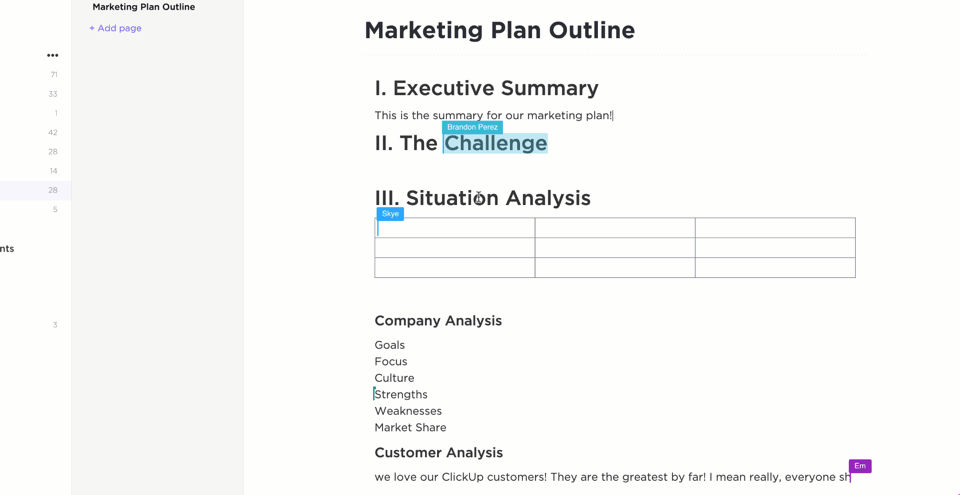Your school has 30 seconds to make a first impression. That’s it.
Whether it’s a parent scrolling through your school website at midnight or driving past your campus during pickup, those fleeting moments determine if they’ll dig deeper or keep looking. 👀
Many schools are still marketing like it’s 2015. They rely on word-of-mouth and hope their reputation speaks for itself. Meanwhile, those thriving have cracked the code on modern marketing strategies for schools.
In this blog post, we’ll explore practical approaches that help schools build trust, increase student enrollment, and attract the right families. Plus, we’ll see how ClickUp helps streamline these marketing efforts. 🤩
- Why Marketing Matters for Schools
- Top 10 Marketing Strategies for Schools
- 1. Create immersive virtual campus experiences
- 2. Leverage student and parent ambassadors
- 3. Develop hyper-local community partnerships
- 4. Implement data-driven digital advertising
- 5. Host signature events that become community talking points
- 6. Invest in content marketing
- 7. Optimize for local search and online reputation
- 8. Develop strategic social media storytelling
- 9. Implement referral reward programs
- 10. Execute targeted direct mail campaigns
- Common School Marketing Challenges (And How to Solve Them)
Why Marketing Matters for Schools
Good marketing helps schools connect with prospective students, highlight what makes them unique, and build lasting trust in their community.
Here’s how it makes a difference. 👇
- Enrollment stability: Consistent, effective school marketing efforts create predictable application flows and reduce enrollment volatility
- Audience fit: Targeted messaging attracts families whose values align with your educational philosophy
- Reputation building: Strategic storytelling across marketing channels positions your school as a community asset and educational leader
- Competitive differentiation: Clear messaging helps prospective families understand what makes your school unique in a crowded space
- Financial sustainability: Strong enrollment gives you the financial ability to fund programs, improve facilities, and maintain faculty budgets
- Alumni and community engagement: Marketing that showcases student success strengthens lifelong school connections
🧠 Fun Fact: Parents care a lot about how a school is seen. In many cases, the school’s reputation matters more than academic rankings. When a school has a strong image, parents are more loyal, stick around longer, and are less price-sensitive.
⭐ Featured Template
ClickUp’s School Enrollment Marketing Plan Template helps schools turn strategy into action. You can map campaigns for the school district and assign tasks across your team.
Everything from messaging to follow-ups stays connected in one place, making it easier to run school marketing plans that reach the right families and show measurable results.
Top 10 Marketing Strategies for Schools
Here are some battle-tested growth marketing strategies for schools to try with support from ClickUp for Education. 🚌
1. Create immersive virtual campus experiences
Families of prospective students today want more than simple websites and brochures. They want a peek directly into your classrooms, laboratories, and communities.
Local schools can win student enrollment battles by creating compelling virtual experiences that make families feel they’ve already spent a day on campus.
You capture culture in real moments—the excited gasp when the basketball team wins the final game of the season, the intense concentration during a high school robotics competition, the laughter echoing through hallways during lunch.
These unscripted moments market your school better than any brochure ever could.
📌 Example: Partner with a local digital media company to create a series of virtual experiences for different school divisions. Families exploring elementary school admissions can virtually sit in on a hands-on science experiment, middle school prospects can observe a debate club meeting, and high school visitors can attend a mock college counseling session.
Key takeaways
- Update virtual content quarterly to reflect seasonal activities and programs
- Include authentic student and teacher voices narrating experiences
- Create mobile-optimized versions for interested families browsing on phones
- Add interactive hotspots that reveal deeper information about specific programs
- Track viewing analytics to understand which virtual experiences drive inquiries
How ClickUp helps
ClickUp’s Marketing Project Management Software makes things easier.
Teams can draft copy in ClickUp Docs, where admissions staff, teachers, and media partners all refine the narrative together in one place. The built-in AI assistant in Docs can also help improve or proofread the copy, or change the style.

Once the story feels right, shift into ClickUp Whiteboards to map the flow of the experience—laying out each scene, connecting story elements, and noting where interactive hotspots or mobile versions come in.
🔍 Did You Know? In Bhutan, education includes something called Gross National Happiness. Students are taught mindfulness, sustainability, and compassion along with their regular subjects.
2. Leverage student and parent ambassadors
When, during a neighborhood barbecue, a parent shares why they chose your school, that conversation between peers carries infinitely more weight than a glossy promotional mailer.
Schools should be prepared to systematically empower these natural advocates. By leveraging happy parents as storytellers, you significantly improve the chances of your message resonating with your target audience.
These ambassadors become your secret weapon for reaching families.
📌 Example: Launch a ‘School Stories’ ambassador program where you encourage families to share their experiences strategically. Pair ambassadors based on shared interests, academic focus, or demographic similarities.
Then, create structured opportunities like coffee meetups, phone calls, and email exchanges where ambassadors can address specific concerns and questions from prospect families.
Key takeaways
- Select ambassadors who represent diverse backgrounds and school experiences
- Support them with marketing material as needed, but ensure their voice remains uniquely theirs
- Track which ambassador connections convert to applications, so you know what kind of messaging lands well
- Recognize top-performing ambassadors
How ClickUp helps
Your parent and student ambassadors can be your most persuasive storytellers, but only if you organize the program with precision. The ClickUp School Enrollment Marketing Plan Template gives you that framework.
You can:
- Segment ambassadors with ClickUp Custom Fields to reflect diverse backgrounds, school levels, or extracurricular ties
- Track outreach activities in ClickUp Board View, moving touchpoints like coffee chats or phone calls through stages such as planned, scheduled, and completed
- Set Automations in ClickUp to remind ambassadors of upcoming calls or alert your team when a conversation leads to an inquiry
3. Develop hyper-local community partnerships
Schools that embed themselves deeply into their communities create outsized value, which is stronger than any marketing campaign. When your students become the solution to local challenges, you generate authentic stories that spread organically through community networks.
Local businesses, nonprofits, and civic organizations need creative solutions, and your students need real-world applications for their learning.
This symbiotic relationship creates positive publicity while showing your educational philosophy in action.
📌 Example: Partner with the local children’s hospital to have high school art students create murals for pediatric wards. Students will gain real-world application of their artistic skills, and the hospital will receive beautiful, uplifting artwork.
Key takeaways
- Identify community challenges that align with your academic programs
- Create measurable outcomes that demonstrate the value of student contribution
- Document and share success stories across multiple platforms and community publications
- Establish annual partnership showcases that celebrate student achievements
How ClickUp helps
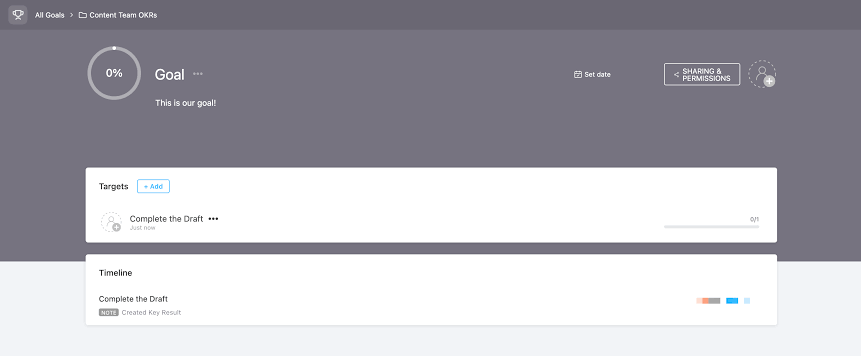
ClickUp Goals gives schools a clear way to track outcomes from community projects. You can define targets like the number of partnerships launched, the hours students contribute, or the media stories published, and progress updates automatically as tasks move forward.
📮 ClickUp Insight: 55% of managers explain the ‘why’ behind projects by tying tasks to larger challenges or goals.
Which means that 45% defaulting to process over purpose can lead to a lack of motivation and drive among team members. Even high performers need to see how their work matters and find meaning in what they do.
It’s time to bridge the gap. Connect individual tasks to overarching Goals and Objectives in ClickUp. Use built-in Relationships and dependencies to show how every effort contributes to the bigger picture, making the tasks more meaningful for everyone in your team.
💫 Real Results: Cartoon Network used ClickUp’s social media management features to finish content publishing 4 months early and manage twice as many social channels with the same team size.
📖 Also Read: Free Marketing Campaign Templates
4. Implement data-driven digital advertising
Generic Facebook ads about your ‘excellent education’ often disappear into the digital void. Precision targeting finds families actively researching schools, recently relocated to your area, or experiencing life transitions that trigger school searches.
The schools dominating digital advertising create multiple, highly-targeted campaigns that speak directly to specific family situations and concerns.
📌 Example: Create separate advertising campaigns for different family segments. During spring enrollment periods, target young families with elementary-aged children with ads featuring early childhood learning environments.
You can simultaneously run campaigns targeting families with high school juniors, focusing on college preparation and advanced academic opportunities.
Key takeaways
- Use lookalike audiences based on your most satisfied current families
- A/B test ad creatives featuring different student demographics and activities
- Implement retargeting campaigns for website visitors who don’t convert immediately
- Track cost-per-inquiry and cost-per-enrollment across different audience segments
How ClickUp helps
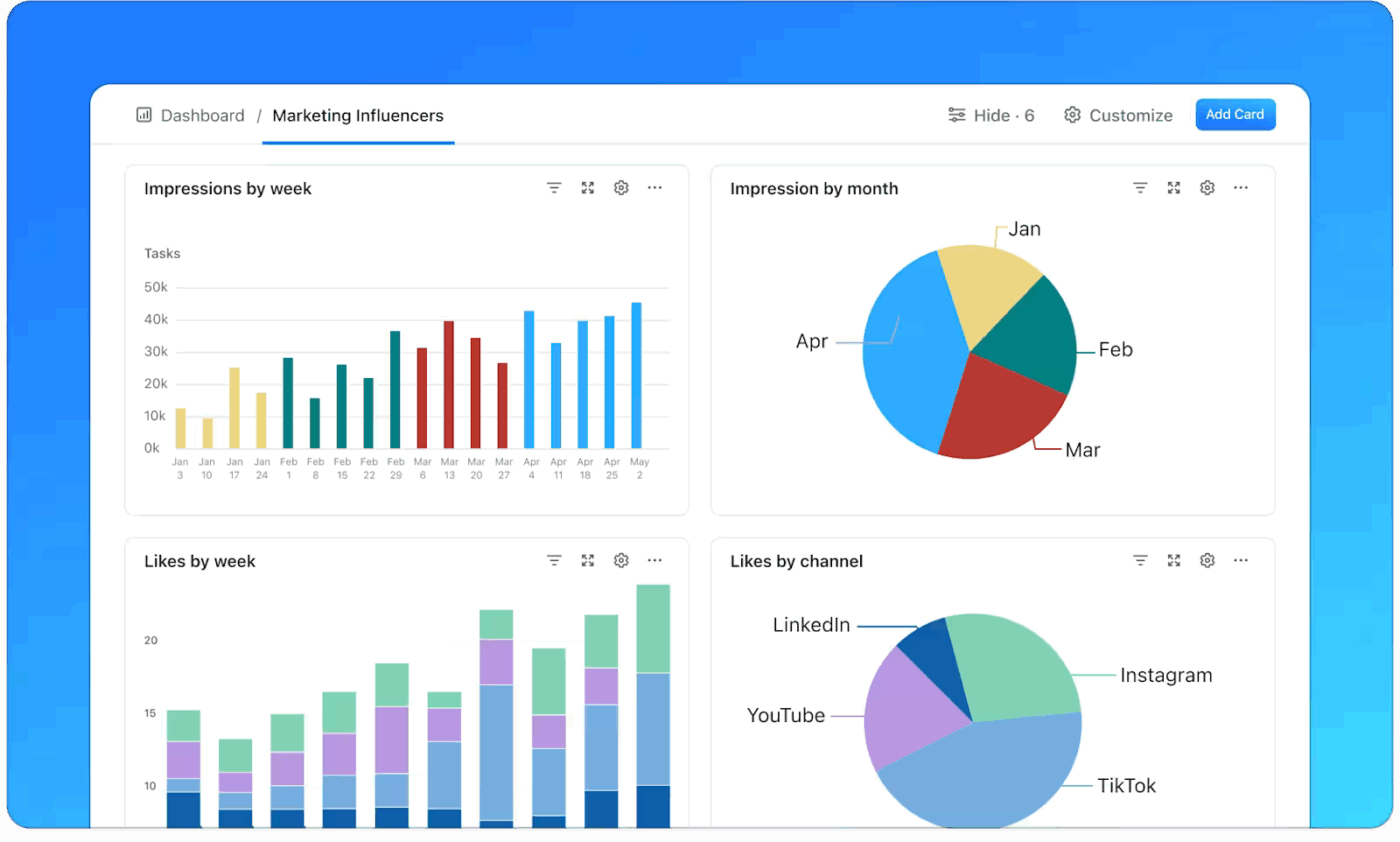
ClickUp Dashboards give schools a clear view of how campaigns perform in real time. You can monitor marketing productivity metrics like cost-per-inquiry, cost-per-enrollment, or engagement rates for different audience segments in one place.
ClickUp Integrations let you sync your ad platforms like Facebook Ads or Google Ads with ClickUp through Zapier, pulling campaign data directly into tasks and dashboards.

📖 Also Read: How to Create a Content Marketing Management Plan
5. Host signature events that become community talking points
Memorable school events create shared experiences that current and prospective families discuss for months afterward.
This field marketing strategy showcases your school’s personality while providing genuine value to attendees. Families should leave feeling they’ve gained insights and experienced something uniquely yours.
📌 Example: Host a ‘Science Under the Stars’ evening where families participate in astronomy observations using professional telescopes while students present their research projects. Include interactive demonstrations and opportunities to meet science faculty informally.
This event showcases STEM programs while creating an experience that families will discuss with friends and neighbors.
Key takeaways
- Limit the audience size to ensure quality interactions
- Train students to act as confident hosts and program ambassadors
- Create Instagram-worthy moments and photo opportunities throughout the event
- Follow up within 48 hours while enthusiasm remains high
- Survey attendees to gather feedback and improve upcoming events
How ClickUp helps
The ClickUp Event Marketing Template keeps everything in one place, so planning never feels scattered. Schools can track RSVPs through Custom Fields and map out each stage of the event in ClickUp Views.
Scheduling is where the ClickUp Calendar adds another layer of support. Once tasks are in the template, the AI calendar helps distribute work across the team, ensuring key prep sessions, volunteer training, and post-event surveys land at the right time.
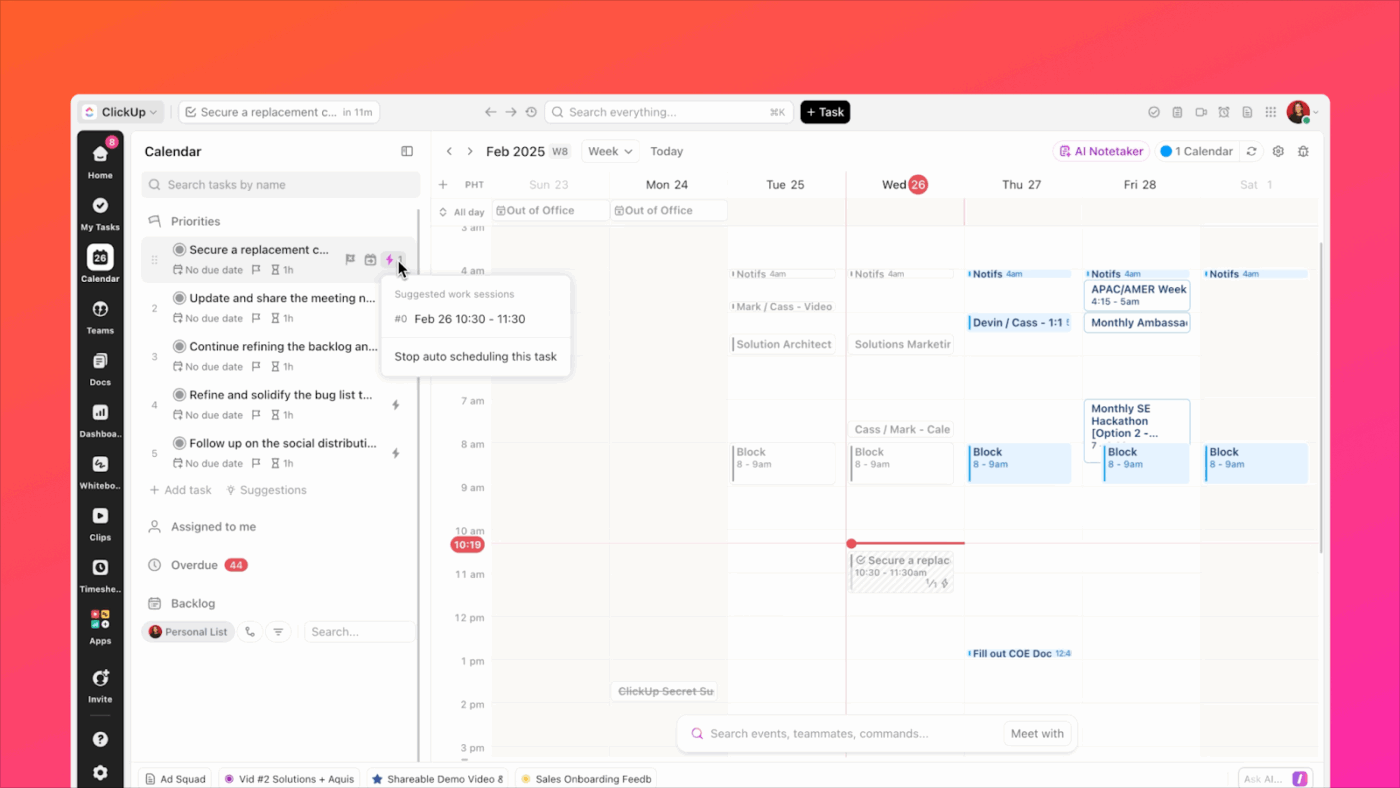
📖 Also Read: Best Campus Management Software
6. Invest in content marketing
Schools that consistently provide valuable educational guidance build trust and credibility that translates directly into enrollment interest.
Successful content marketing establishes your faculty and administration as thought leaders who understand both educational trends and parenting challenges. This expertise-based approach attracts families seeking education experts rather than just service providers.
📌 Example: Launch a weekly podcast series called ‘Learning Beyond the Classroom’ featuring interviews with faculty members, alumni, and education experts. Topics might include navigating college admissions, developing critical thinking skills, or fostering creativity in children.
Distribute episodes across major podcast platforms and share highlights on social media platforms. This positions your school as an educational resource while showcasing faculty expertise.
Key takeaways
- Publish content consistently on a predictable schedule
- Address trending educational topics and current parent concerns
- Include actionable advice that readers can implement immediately
- Repurpose blog content into social media posts, newsletters, and presentation materials
- Guest post on local parenting websites and education publications
How ClickUp helps
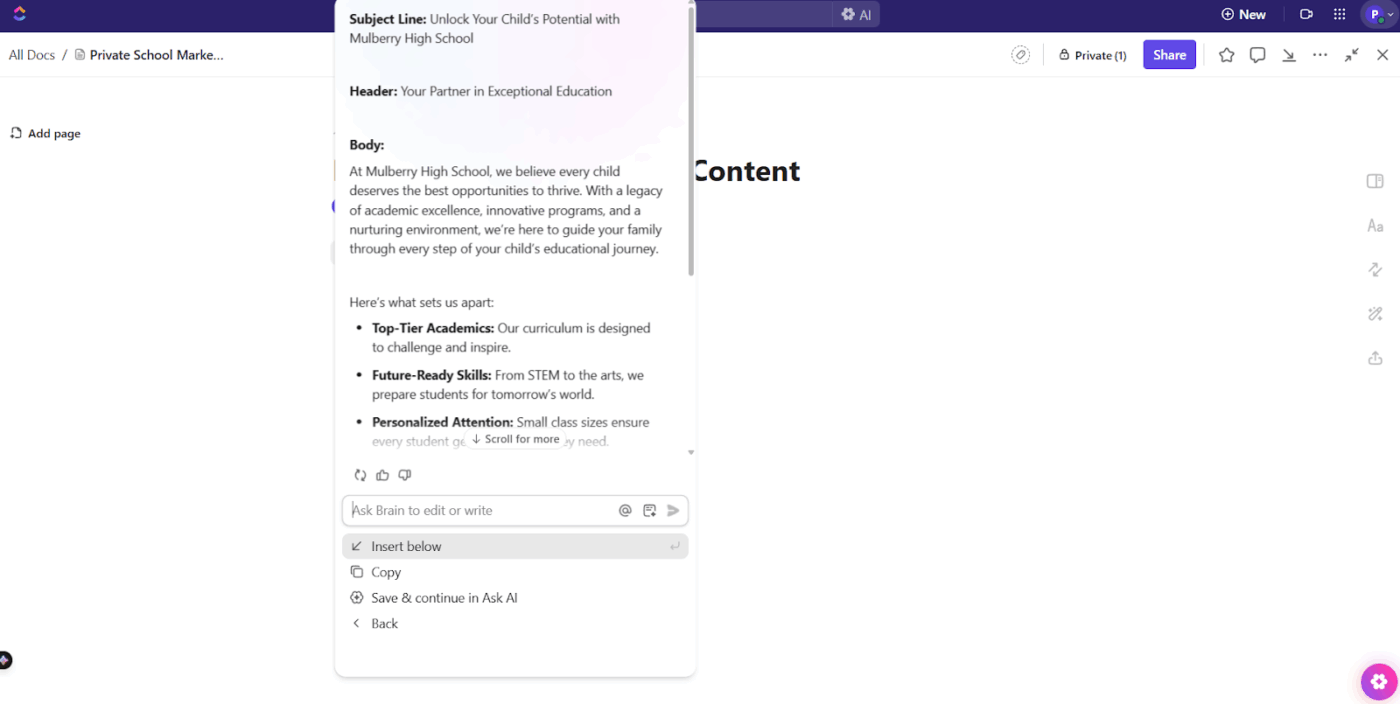
Many schools find it hard to publish regularly while keeping topics fresh. ClickUp Brain, the integrated AI assistant, helps solve that. It works inside Docs, so you can research, draft, and edit without leaving your workspace.
Faculty or admissions staff can start with rough notes in a Doc, then use ClickUp Brain to expand them into structured outlines, refine the language, or suggest titles for blogs, podcasts, or school news.
Since everything stays in Docs, collaboration is seamless, and feedback loops stay short.
🚀 Try this prompt: Can you suggest newsletter ideas that position Mulberry High School as an educational expert and helps us reach families better?
💡 Pro Tip: Use admissions season to test messaging. If you’re running multiple social media ads or open house invites, experiment with different value props—academic performance, creative curriculum, safety, etc. The one parents click on most is your messaging anchor for the year.
7. Optimize for local search and online reputation
Your digital presence must be discoverable, informative, and compelling across all platforms where families might encounter your school. Ensure your school appears prominently in local search engine results for relevant educational keywords.
Also, focus on online reputation management to control the narrative about your school across review platforms, social media channels, and community forums.
📌 Example: Create location-specific landing pages for families searching terms like ‘best private schools near [neighborhood name]’ or ‘college prep schools in [city]’. Include testimonials from families in those specific areas, transportation information, and community connections.
Regularly publish blog content about local educational topics and participate in community forums where families discuss school options.
Key takeaways
- Claim and optimize listings on all major directory and review platforms
- Implement local search engine optimization plans, including Google My Business
- Develop marketing communication strategies for handling negative online feedback
- Track online sentiment and search rankings monthly to identify improvement opportunities
How ClickUp helps
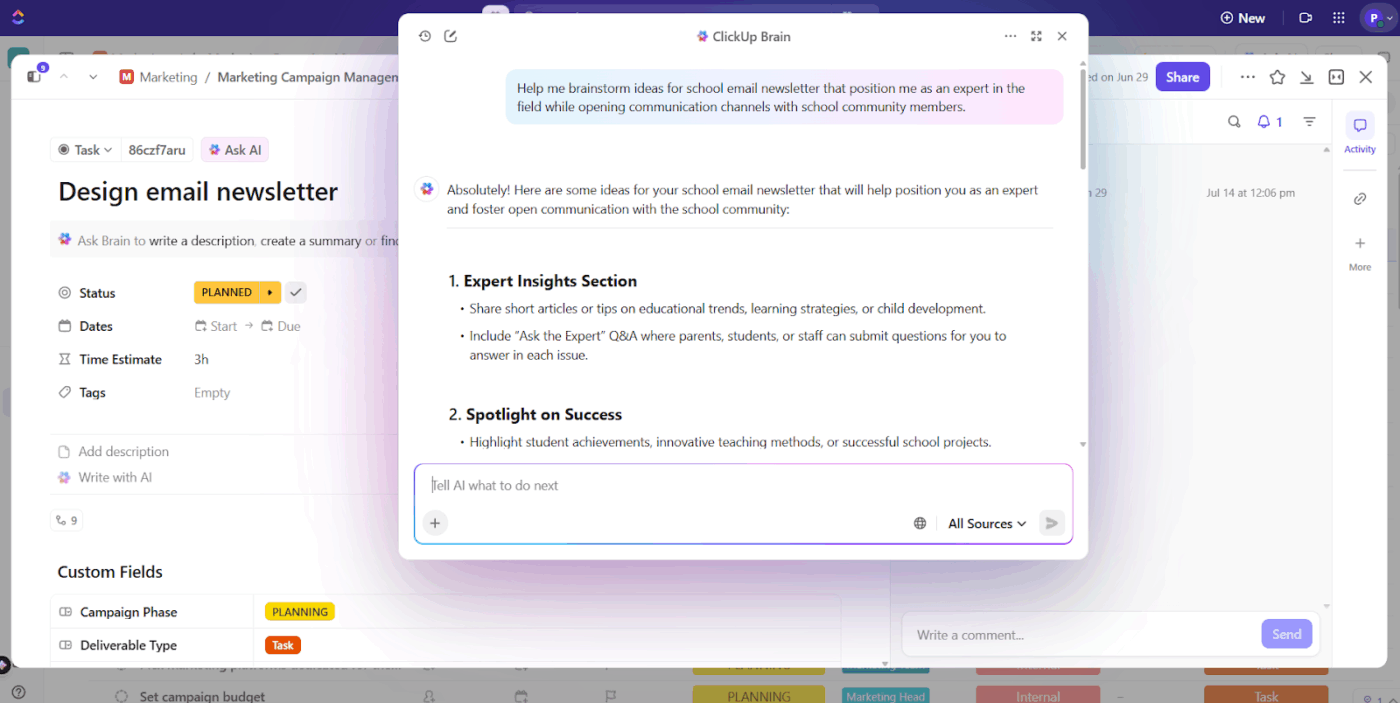
ClickUp Brain lives across your workspace, so you can brainstorm marketing ideas, draft SEO copy, or even respond to reviews without leaving ClickUp. That makes it easier to stay on top of content that keeps your school visible in local searches.
It also supports AI image generation, so your team can spin up visuals for landing pages or social posts right inside ClickUp.
🧠 Fun Fact: In the 1980s, private schools in the US started using billboard ads to compete for enrollment, especially in suburban areas. That shift marked the beginning of education being treated more like a competitive market.
8. Develop strategic social media storytelling
Platform-specific school marketing strategies will help maximize the impact of your social media campaigns. To put this into perspective:
- Instagram showcases visual moments and behind-the-scenes content
- LinkedIn targets parents professionally while highlighting career preparation programs
- TikTok reaches families through student-generated content and trending topics
📌 Example: Create ‘Student Voice Fridays’ featuring weekly Instagram takeovers where different students share their typical day through Stories. Include classes, lunch conversations, extracurricular activities, and homework time.
Key takeaways
- Use school-branded hashtags consistently to build community around your content
- Share user-generated content from current families to increase authentic reach
- Monitor social media conversations about your school and education in general
How ClickUp helps
Families connect with stories, not ads. ClickUp’s School Social Media Marketing Plan Template gives your team a single hub to plan and manage those campaigns.
You can map content across Instagram, LinkedIn, and TikTok in the Calendar View, assign posts to staff or student ambassadors, and keep track of approvals.
Not on ClickUp yet? See what this user had to say:
9. Implement referral reward programs
Your alumni, as well as families of past and present students, can help spread your word. Strategic referral programs can turn this extended reach into structured educational marketing efforts.
Design rewards that enhance the school experience rather than feeling transactional. Alumni and families should feel valued for contributing to school community growth rather than compensated for sales activities.
📌 Example: Launch the ‘Community Builder’ program where successful referrals earn points toward exclusive experiences. 25 points might unlock priority registration for popular summer programs, 50 points could provide reserved parking spaces, and 100 points might earn private campus tours for visiting relatives.
Key takeaways
- Track referral success rates to identify your most effective campaigns
- Provide referral tools, including digital materials and talking point guides
- Celebrate successful referrals publicly to encourage continued participation
How ClickUp helps
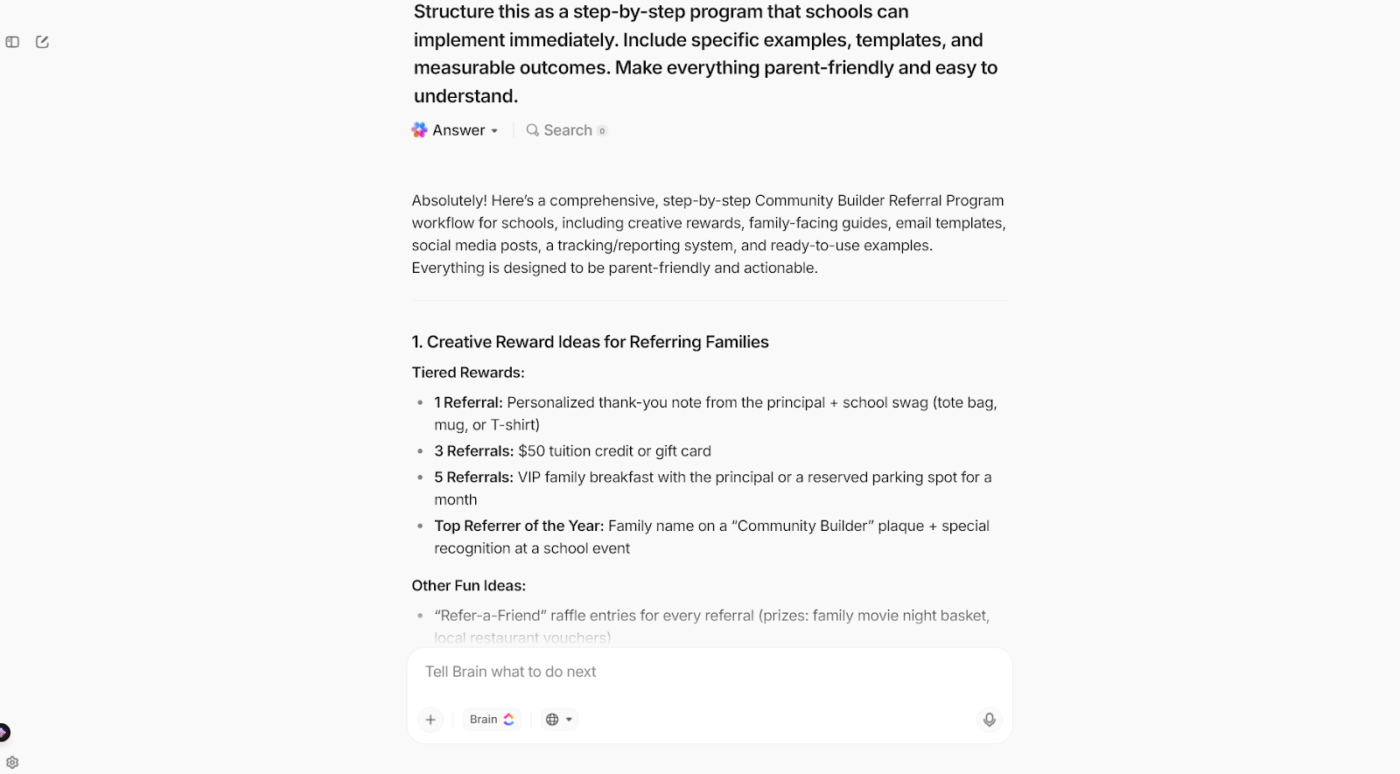
ClickUp Brain MAX helps schools design and scale referral programs. As a desktop AI companion, it integrates talk-to-text, enterprise search, and multi-model AI into one place, allowing teams to move faster while staying organized.
When building a Community Builder program, dictate reward ideas through Talk to Text in ClickUp and watch Brain MAX turn them into polished family-facing guides. On average, teams write 400% more without typing and save an hour each day, freeing staff to focus on nurturing relationships instead of formatting documents.
It can also generate variations of referral emails, draft social media shoutouts for top ambassadors, and create accurate progress reports.
🚀 Try this prompt: Help me design a complete Community Builder referral program workflow for schools. I need you to:
- Generate creative reward ideas for families who refer new students
- Create polished, family-facing guides that explain how the referral program works
- Write multiple variations of referral invitation emails that parents can send
- Draft social media posts celebrating our top parent ambassadors
- Design a progress tracking system with reporting templates
Structure this as a step-by-step program that schools can implement immediately. Include specific examples, templates, and measurable outcomes. Make everything parent-friendly and easy to understand.
💡 Pro Tip: Position your school as a community hub. Host workshops, book swaps, or wellness sessions open to local parents, even if they don’t have kids in your school. It builds trust, word of mouth, and long-term brand recall without the hard sell.
10. Execute targeted direct mail campaigns
Digital marketing dominance hasn’t eliminated the effectiveness of well-executed direct mail campaigns. Physical materials create tangible connections and often receive more attention than digital communications.
Create materials that reflect your school’s attention to detail while providing information families actually want to keep and reference.
📌 Example: Send personalized admission packets to families who have requested information. Include a handwritten note from the admissions director referencing specific details from the family’s inquiry.
Plus, you can add a small branded item like a bookmark or sticker pack that children can use, keeping your school top-of-mind.
Key takeaways
- Segment mailing lists based on inquiry sources and family demographics
- Include compelling calls-to-action with specific next steps and deadlines
- Track response rates and adjust messaging based on marketing KPIs
- Coordinate direct mail timing with other marketing activities for maximum impact
💡 Pro Tip: Create ‘alumni spotlights’ with purpose. Highlight what past students are doing now, and how the school helped shape that outcome. That’s what parents want to see.
Common School Marketing Challenges (And How to Solve Them)
Here are the biggest challenges we see schools struggling with and how to tackle them head-on. ⚒️
⚠️ Scattered efforts across multiple platforms
Your admissions team posts sporadically on Instagram, sends occasional newsletters, and launches campaigns without clear coordination. Meanwhile, your development office creates separate messaging for donors, and teachers share classroom updates independently.
These mixed messages confuse families and can dilute your school’s brand identity.
✅ The fix: Develop a comprehensive marketing playbook that standardizes your approach across every channel. This living document should include messaging guidelines, content calendars, approval processes, and response protocols.
⚠️ No clue what’s working
You spend money on Facebook ads, direct mail campaigns, and fancy brochures, but honestly have no idea which ones bring in applications.
Your gut says the Instagram posts are working, but your budget committee wants real numbers.
✅ The fix: Enterprise marketing software connects your marketing dots to actual enrollment decisions. These platforms track prospect journeys from first website visit through enrollment, showing which touchpoints influence decisions and which investments provide the strongest return.
⚠️ Limited budgets competing against better-funded competitors
The well-funded school across town has a dedicated marketing team while you’re managing admissions, marketing, and probably three other roles.
You’re tired of losing great families to schools with flashier campaigns.
✅ The fix: Use AI for digital marketing to handle the routine stuff like scheduling posts and sorting leads. Free up your time for the relationship-building that supports your institution in the long run.
📖 Also Read: How to Use AI for Students (Use Cases & Tools)
Power Marketing for Schools With ClickUp
Strong marketing strategies for schools only work when they move beyond planning and into action.
ClickUp gives schools the space to run these efforts. You can plan enrollment campaigns, keep events on track, manage referral rewards, and publish fresh content without bouncing between tools.
ClickUp Brain handles transcripts and quick actions, Brain MAX drafts content that’s ready to share, and templates keep everything moving on schedule. Plus, with task management, documents, and team chats all in one easy-to-use AI-powered platform, ClickUp gives you a single Converged AI Workspace for all your work.
That’s how your team saves hours and creates the kind of moments that win families over.
Why wait? Sign up for ClickUp today! 📋





